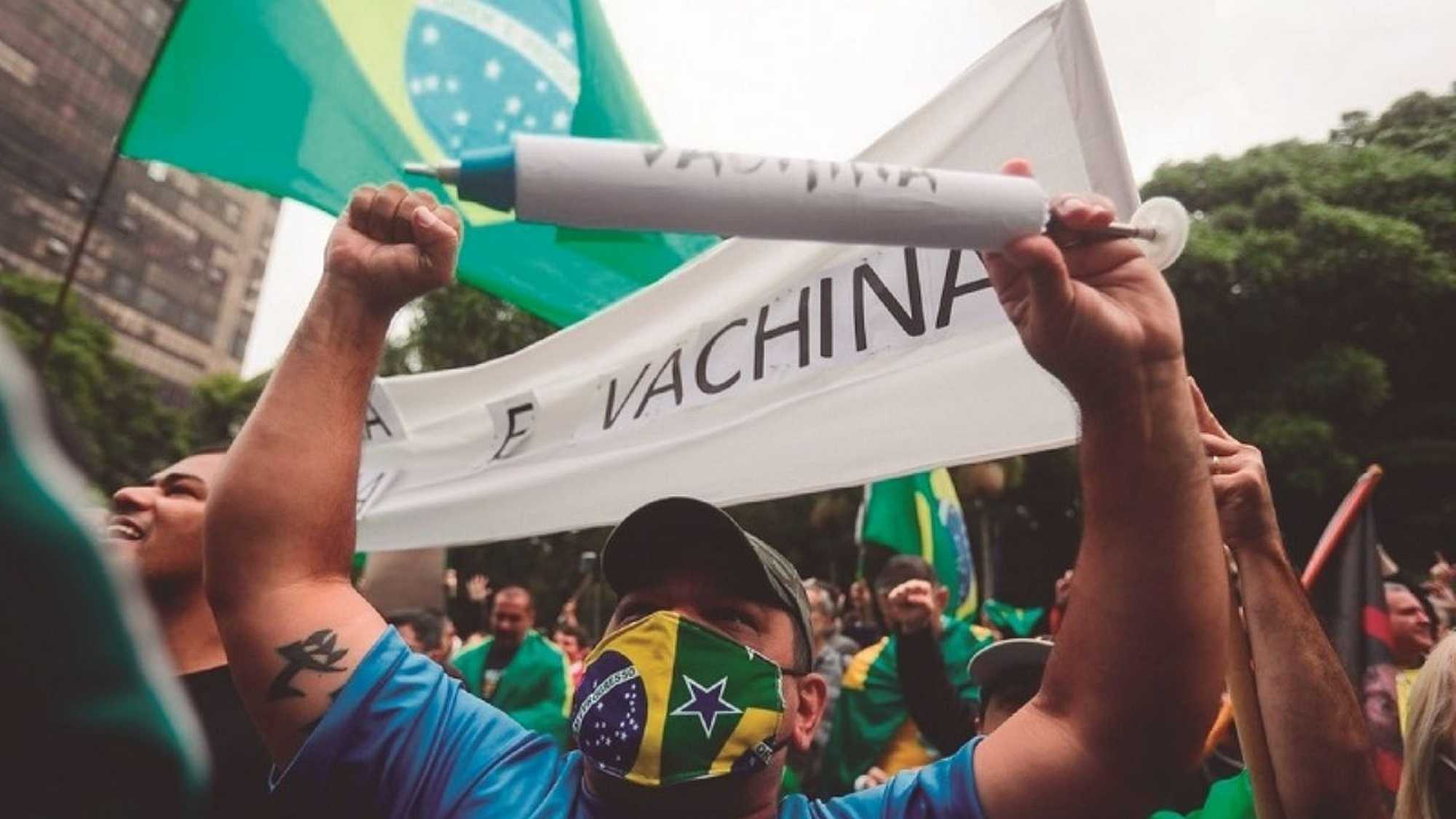More than 300 Brazilians gathered on São Paulo’s main commercial thoroughfare on Sunday to protest state Governor João Doria’s support for mandatory Covid-19 immunization and testing CoronaVac, the potential vaccine developed by Chinese lab Sinovac.
Doria has previously spoken in favor of making immunizations mandatory, once vaccines are available, sparking a spat with President Jair Bolsonaro who vows it will be voluntary. The Supreme Court’s chief justice has said the court will ultimately decide on the issue.
A number of vaccines are obligatory in Brazil, including for example Hepatitis B which is given to newborns. Brazil has had great success with large vaccination campaigns in the past, eradicating polio in the 1980s for example.
In São Paulo, the CoronaVac vaccine is being tested as part of phase III clinical trials with support from the Doria government.
Brazil’s federal health ministry announced last month it would buy 46 million doses of the vaccine, contingent on regulatory approval, in a deal supported by state governors. But a day later President Jair Bolsonaro said that Brazil would not buy the vaccine.
Bolsonaro has bashed China intermittently since the campaign trail in 2018, over the Asian countries growing investments and influence in Brazil.
The protestors in São Paulo rallied in support of Bolsonaro, with one demonstrator holding a sign saying “We are not guinea pigs” and another in a mask that said “No vaccine.” Many of the tightly packed protestors did not wear masks.
“We’re against the authoritarian Chinese ambassador João Doria, who would now make the vaccine compulsory against our wishes,” protestor Andre Petros said. “This doesn’t happen anywhere in the world, not even in China.”
Brazil has the third-worst outbreak of coronavirus globally, with 5.5 million cases, after the United States and India.
Federal Involvement
Bolsonaro announced on October 21 that the federal government would not purchase vaccine CoronaVac, which is being developed by Chinese pharmaceutical company Sinovac in partnership with the Butantan Institute, which belongs to the state government of São Paulo.
Before it is made available for the population, the president said, the vaccine should be “scientifically proven” by the Ministry of Health and certified by national sanitary watchdog Anvisa.
“Brazilian people will be no one’s guinea pig. A financial investment of billions on a medication that has not even completed its testing phase cannot be justified,” Bolsonaro wrote on his social media.
After an online meeting with governors, Health Minister Eduardo Pazuello had signed a protocol of intents to acquire 46 million doses of CoronaVac, aiming to expand the supply of vaccines for Brazilians. For that, the federal government was going to earmark budgetary credit adding up to US$ 340.3 million.
According to the ministry, the acquisition process was going to take place only after the vaccine was approved and registered by Anvisa. To help with vaccine production, the ministry had already unveiled US$ 14.3 million as investment for the expansion of structure at Butantan.
Elcio Franco, executive secretary with the Health Ministry, reported “there was a problem in the interpretation of the health minister’s words,” and there was no commitment whatsoever with the government of São Paulo state in connection with the acquisition of the vaccine against COVID-19.
“It was a nonbinding protocol of intent between the Ministry of Health and the Butantan Institute, as it concerns a big partner of the Health Ministry in the production of vaccines for the National Program of Immunizations [PNI].”
Franco noted that “it is another attempt to provide safe and efficient vaccine for our people, in this case like a Brazilian vaccine,” and if it is available before that of AztraZeneca/Oxford or the one from Covax, “there is no intention of purchasing Chinese vaccines,” he stressed.
The secretary underscored that any vaccine pends technical assessment and approval by Anvisa, the Regulation Chamber of the Drug Market (CMED) and the National Commission of Technological Incorporation (Conitec) of Brazil’s National Unified Health Care System (SUS).
He restated that any vaccine available, certified by Anvisa and acquired by the Health Ministry, will be offered to Brazilians as part of the PNI initiative, and “as far as this ministry is concerned, it will not be mandatory.”
CoronaVac is in Phase 3 of human testing, and, according to the Butantan institute, it is a safe vaccine — in other words, it shows no severe side effects. In all, tests will be conducted on 13 thousand volunteers, and are estimated to be concluded by December.
Should the last stage of tests prove the efficiency of the vaccine, the deal between Sinovac and Butantan includes the transfer of technology for the production of the vaccine in Brazil, which will be administered in two doses per person.
MP/ABr






